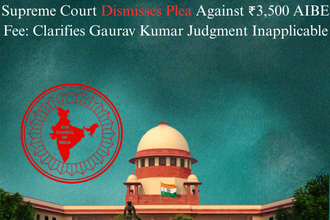The Karnataka High Court on Tuesday closed a Public Interest Litigation (PIL) seeking a ban on pornographic websites and mobile applications, including platforms such as Pornhub, Brazzers, OnlyFans, and others. The Division Bench of Chief Justice Vibhu Bakru and Justice CM Poonacha observed that the issue raised in the PIL is already being considered by the Supreme Court of India. Therefore, the High Court stated it would not be appropriate to adjudicate on the matter simultaneously.
The PIL and Its Demands
The petition, filed by The Legal Attorneys and Barristers Law Firm in 2024, sought:
- A complete ban on websites and mobile apps allegedly hosting pornographic or obscene content.
- Directions to the Central Government to block access to such platforms in India.
- Strict enforcement actions under relevant Indian cyber and obscenity laws.
The petitioner argued that pornography is widely accessible, especially to minors, and contributes to:
- Exploitation of women
- Objectification and commodification of bodies
- Disturbance of social morality
- Increase in sexual crimes
The PIL particularly named platforms such as:
- Pornhub
- Brazzers
- OnlyFans
- Other adult content sharing sites and subscription-based applications
The plea claimed that many of these platforms operate in violation of Indian laws, including the Information Technology Act, the Indian Penal Code (IPC), and the Protection of Children from Sexual Offences (POCSO) Act.
Why the Karnataka High Court Refused to Hear the PIL
During the recent hearing, Deputy Solicitor General (DSG) H Shanti Bhushan informed the Court that a similar matter involving the regulation, blocking, and censorship of adult content online is already pending before the Supreme Court.
Taking note of this, the High Court stated:
“We are of the opinion that it would not be appropriate to consider the present PIL at this stage. Hence, no order is required.”
In essence, the High Court closed the PIL on the ground of judicial propriety and hierarchical discipline. When the Supreme Court is seized of an overlapping issue, High Courts generally refrain from duplicating proceedings, to avoid conflicting judgments and legal inconsistency.
Background: India’s Anti-Pornography Regulation Efforts
2015 Porn Ban
In 2015, the Indian government ordered internet service providers (ISPs) to block over 800 pornographic websites. The move was part of a broader effort to regulate online obscenity. However, it led to public criticism and technical concerns because:
- Several non-porn platforms were mistakenly blocked.
- The ban appeared overbroad and difficult to enforce.
- It raised digital freedom and privacy concerns.
Because of these concerns, the government later narrowed the restrictions, focusing primarily on child sexual abuse material (CSAM), which remains illegal under all circumstances.
Current Legal Framework
Key laws relevant to online porn in India include:
| Law / Provision | What It Prohibits |
|---|---|
| IT Act, Section 67 & 67A | Publishing or transmitting obscene or sexually explicit material online |
| POCSO Act | Absolute ban on child pornography and exploitation of minors |
| IPC Sections 292–294 | Sale, distribution, or public exhibition of obscene materials |
However, adult pornography for private consumption is not explicitly criminalized, creating a complex regulatory environment.
The Issue of Enforcement
Even when bans are issued, they are difficult to enforce because:
- Websites can easily mirror themselves under new URLs.
- Users can access blocked platforms through VPNs.
- Enforcement requires constant technical monitoring and inter-agency coordination.
This has led courts to repeatedly emphasize that policy regulation in this area must largely come from the executive and legislature, not through blanket court orders.
Why the Matter is Significant Socially and Legally
This case ties into larger national debates on:
- Digital morality vs. personal freedom
- Cyber safety for minors
- Regulation of global online platforms operating in India
- Impact of pornography on sexual violence and behavior
Some argue that pornographic content fuels sexual exploitation, addiction, and unrealistic sexual expectations. Others argue for individual autonomy, privacy rights, and freedom of expression.
Courts therefore approach such issues cautiously, balancing:
| Concern | Constitutional Value |
|---|---|
| Protection of minors & public morality | Article 19(2) reasonable restriction |
| Personal autonomy & privacy (adult choice) | Right to Privacy under Article 21 |
What Happens Next?
Since the matter is now before the Supreme Court, the regulatory direction regarding pornography and adult-content platforms in India will depend on the outcome of that case.
The Supreme Court may consider:
- Whether a nationwide regulatory framework is required.
- Whether selective or blanket bans are constitutionally justified.
- Whether platforms like OnlyFans (content + monetization) require platform-level compliance guidelines.
Until then, status quo remains — selective blocking continues, particularly regarding child sexual abuse content, while general adult pornography remains difficult to regulate completely.
Conclusion
The Karnataka High Court did not dismiss the PIL on merit — rather, it closed the case because the Supreme Court is already examining the larger issue. This reflects judicial consistency, prevents conflicting rulings, and centralizes the outcome at the national level.
The debate over online pornography in India remains complex, involving competing concerns of morality, privacy, legality, and technological feasibility. The final word will now come from the Supreme Court, which will set the future course for the regulation of adult online content across India.


